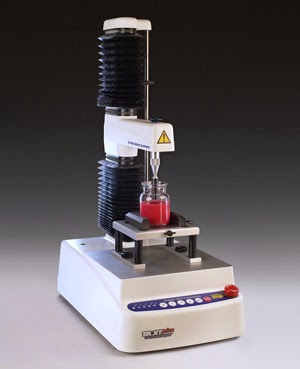When it comes to a taste panel consumers might include words such as gloopy, mushy or thickness but a company developing a new product needs to know exactly what consumers mean by those terms in order to target particular characteristics.
Establishing a common language to describe textural terms is vital to product development. Product developers need to decide upon the exact meaning of words that are used to describe their products (such as creamy, brittle, resilient).
Matthew Patrick, from TIC Gums, explained the process in his team several years ago in an interview with Food Navigator...
“More useful than consumer feedback about texture is evaluating the various textural qualities of products in-house. The whole team takes a group of benchmark products and defines them together, then defines the target attribute. Developing this common language to describe texture is crucial to product development as texture can make an enormous difference in terms of consumer acceptance of a product.”
In 1974 Ronald Jowitt published an article in the Journal of Texture Studies (5, 351-358) entitled ‘The Terminology of Food Texture’. He reported definitions for over 60 textural terms which Stable Micro Systems have over the years referred to as a guide to help texture analyser users understand the meaning of their measurements and relate to the properties that their products possess.
Only when you agree upon the target attributes and their vocabulary can you design your texture analysis methods to measure these terms. Whilst one company can refer to their product as being hard, another may refer to their product’s firmness. To a Texture Analyser, both parameters are likely to be determined by recording their maximum positive force or the force at a specific distance but both may be obtained by completely different types of test e.g. penetration, three point bend, compression. Whilst a Texture Analyser is extremely good at accurate measurement and sophisticated analysis it cannot decide for you what textural terms must be used.
This is where Stable Micro Systems (and their network of distributors) show their expertise perfectly. No-one knows more about texture analysis and how to choose the optimum method for the parameters you are looking to measure.
Texture analysis is not a fundamental science like materials science or rheology and whilst it provides flexibility of test method (and is not bound by standard methods) it requires standardisation of terms within a company so that a product’s texture is understood by personnel and therefore measured correctly.
Make sure you’re all speaking the same language for texture analysis success!
For more information on how to measure texture, please visit the Texture Analysis Properties section on our website.
 The TA.XTplus texture analyser is part of a family of texture analysis instruments and equipment from Stable Micro Systems. An extensive portfolio of specialist attachments is
available to measure and analyse the textural properties of a huge range of
food products. Our technical experts
can also custom design instrument fixtures according to individual
specifications.
The TA.XTplus texture analyser is part of a family of texture analysis instruments and equipment from Stable Micro Systems. An extensive portfolio of specialist attachments is
available to measure and analyse the textural properties of a huge range of
food products. Our technical experts
can also custom design instrument fixtures according to individual
specifications.No-one understands texture analysis like we do!
To discuss your specific test requirements, click here...
 |  |  |


No comments:
Post a Comment